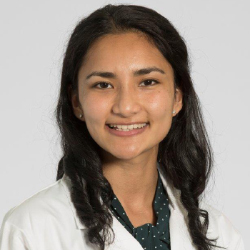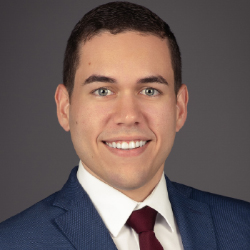For Immediate Release
Friday, Oct. 20, 2023
Contact:
Yvonne Hylton yvonne.hylton@nih.gov
NIH Medical Research Scholars Program welcomes the 2023-2024 class
The National Institutes of Health Medical Research Scholars Program (MRSP) class of 2023-2024 arrived at the NIH campus this summer for their MRSP fellowship and embarked upon a 10 to 12-month research experience.

Shelby Johnson, MPH
University of Texas at Austin
Dell Medical School
The MRSP is for future clinician-scientists that advances health by inspiring careers in biomedical research. By engaging students in basic, clinical, or translational research investigations, offering a curriculum rich in didactics and professional development, and featuring a robust mentorship and advising program, MRSP prepares its Scholars to become leaders in medicine and biomedical research.
“The Medical Research Scholars Program is playing a critical role in increasing the talent and diversity of the biomedical research community in our nation. Our mission is to bring highly talented medical, dental, and veterinary students to the NIH for a year of dedicated research training, and immerse them in an environment that is rich in science, mentoring, and collaboration. From this experience, our Scholars enter clinical training inspired to seek careers as clinician-scientists, to turn discovery into health,” said Dr. Thomas R. Burklow, director of the MRSP.
The MRSP received 124 eligible applications for the 2023-2024 class. Upon review by a panel of NIH investigators, 87 applicants were interviewed.
After careful review and evaluation, the 2023-2024 class was finalized and consists of:

Monica Nair, Cleveland Clinic
Lerner College of Medicine
Case Western Reserve University
- 52 medical school participants
- 39 represented US accredited universities
- 46 third-year and five second-year students, and one fourth-year student
- 56% female participants
- 17% participants from historically underrepresented populations
For the first time, the incoming MRSP scholars came to the NIH campus prior to starting their MRSP fellowship. They received guidance on identifying and securing their MRSP mentor, learned important steps for onboarding and arriving, and participated in NIH institute/center (IC) informational sessions in 15 different NIH ICs.
During this formative stage of my training, taking a year to engage solely in research at the NIH will be an indispensable part of my journey as an aspiring surgeon-scientist. I am grateful for this opportunity and look forward to working with new mentors and peers.
– Shelby Johnson, MPH, University of Texas at Austin - Dell Medical SchoolJoining the NIH MRSP has been a dream of mine since starting medical school. I look forward to immersing myself in clinical trial research and learning skills to become a physician-scientist. I am so excited for this dedicated research time and opportunity to meet new mentors and friends from all across the country!
– Monica Nair, Cleveland Clinic Lerner College of Medicine of Case Western Reserve University

Francisco Rodriguez-Matos
San Juan Bautista
School of Medicine
It is an honor of being selected to become part of a program such as the NIH-MRSP. I am beyond thrilled to learn and engage in research under the mentorship of leaders in the field, and I am looking forward to meet and interact with peers whom share similar professional and academic endeavors.
– Francisco Rodriguez-Matos, San Juan Bautista School of Medicine
The selected participants receive robust mentored training and conduct research in areas that match their personal interests and research and career goals. The training experience forms the core of the program and allows the Scholars to carry out research across the full spectrum of science in the interest of improving public health. Mentors are full time NIH investigators with basic, clinical, or translational research programs. The scholars also work with an Advisor who provides guidance on creating a career development plan. Over the course of the academic year, MRSP scholars participate in a seminar series with invited speakers that include Institute Directors and distinguished senior investigators, engage in clinical teaching rounds, and take part in journal club presentations. They also present their research to the NIH community and at national professional full-time conferences.
The MRSP is supported by the NIH and other partners via contributions to the Foundation for the National Institutes of Health. Including the incoming class, 572 students have participated in the MRSP program since its inception in 2012.
MRSP 2023-2024 scholars:
- Maame-Animwah Amoako, Duke University School of Medicine
- William Azar, Georgetown University School of Medicine
- Devin Barzallo, Case Western Reserve University School of Medicine
- Gitanjali Bhushan, Pennsylvania State University College of Medicine
- Ujwal Boddeti, University of Maryland School of Medicine
- Paul Borgman, Florida State University College of Medicine
- Gregory Boyek, Drexel University College of Medicine
- Emad Chishti, University of Kentucky College of Medicine
- Alexandra Firek, Florida International University Herbert Wertheim College of Medicine
- Jonathan Freeman, University of Nevada, Reno School of Medicine
- Avery Funkhouser, University of South Carolina School of Medicine, Greenville
- Manasa Gadiraju, University of Missouri - Kansas City School of Medicine
- David Gelikman, University of Central Florida College of Medicine
- Alexa Golbus, Medical University of South Carolina College of Medicine
- Ashley Golbus, Medical University of South Carolina College of Medicine
- Brady Greene, Cleveland Clinic Lerner College of Medicine of Case Western Reserve University
- Jessica Hsueh, Georgetown University School of Medicine
- Hannah Huth, University of Tennessee Health Sciences Centers College of Medicine
- Kristen Ibanez, University of Central Florida College of Medicine
- Megan Jiao, McGovern Medical School UTHealth Houston
- Shelby Johnson, University of Texas at Austin - Dell Medical School
- Annette Kaminaka, Albany Medical College
- Elizabeth Karanja, University of Missouri - Columbia School of Medicine
- Alexander Karius, Johns Hopkins University School of Medicine
- Amir Kaskas, Louisiana State University School of Medicine Shreveport
- Kathy Li, Medical College of Georgia at Augusta University
- Marie Luff, David Geffen School of Medicine at UCLA
- Sahit Menon, University of California, San Diego School of Medicine
- Monica Nair, Cleveland Clinic Lerner College of Medicine of Case Western Reserve University
- Samantha Nishimura, Drexel University College of Medicine
- Sade Orejobi, Duke University School of Medicine
- Sarah Phillips, Eastern Virginia Medical School
- Minali Prasad, Boston University School of Medicine
- Shivani Ramolia, Rutgers, Robert Wood Johnson Medical School
- Ihika Rampalli, Baylor College of Medicine
- Nityam Rathi, Cleveland Clinic Lerner College of Medicine of Case Western Reserve University
- Francisco Rodriguez-Matos, San Juan Bautista School of Medicine
- Saswat Sahoo, Cleveland Clinic Lerner College of Medicine of Case Western Reserve University
- Kyle Schuppe, Washington State University Elson S. Floyd College of Medicine
- Gustavo Serrano-Berrios, Ponce Health Sciences University School of Medicine
- Sonal Sharda, University of Massachusetts Medical School
- Jennifer Strong, University of Maryland School of Medicine
- Abhinav Suri, David Geffen School of Medicine at UCLA
- Si Jie Tang, University of California, Davis School of Medicine
- Julia Telischi, University of Miami Miller School of Medicine
- Jacob Tribble, University of Missouri - Kansas City School of Medicine
- Elizabeth Varghese, Renaissance School of Medicine at Stony Brook University
- Jack Victory, West Virginia University School of Medicine
- Erin Walker, University of South Carolina School of Medicine, Greenville
- Scott Wilson, Albert Einstein College of Medicine
- Natalie Yakobian, Saint Louis University School of Medicine
- David Zarrin, David Geffen School of Medicine at UCLA
###
The NIH Clinical Center is the world’s largest hospital entirely devoted to clinical research. It is a national resource that makes it possible to rapidly translate scientific observations and laboratory discoveries into new approaches for diagnosing, treating, and preventing disease. Greater than 1,600 clinical research studies are conducted at the NIH Clinical Center, including those focused on cancer, infectious diseases, blood disorders, heart disease, lung disease, alcoholism and drug abuse. For more information about the Clinical Center, visit https://www.cc.nih.gov/.
NIH, the nation's medical research agency, includes 27 Institutes and Centers and is a component of the U.S. Department of Health and Human Services. NIH is the primary federal agency conducting and supporting basic, clinical, and translational medical research, and is investigating the causes, treatments, and cures for both common and rare diseases. For more information about NIH and its programs, visit www.nih.gov.

